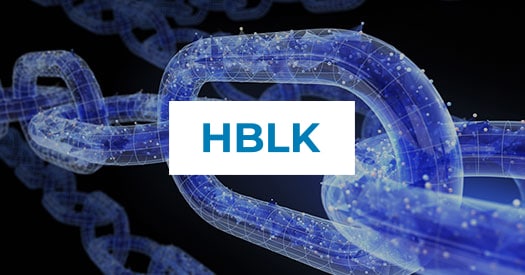By Harvest ETFs

That broad-strokes narrative hides another story about Blockchain in 2022 though. As one portfolio manager explained, a new crop of dedicated companies and established large-cap technology leaders are spearheading the adoption of blockchain technology in fields far beyond crypto.
“The investable universe of blockchain companies continues to be diverse,” said Kushal Agarwal, Portfolio Manager at Harvest ETFs responsible overseeing for the Blockchain Technologies ETF (HBLK:TSX). “We have large-cap companies which are not directly related to the crypto economy, and we have smaller companies which are not gearing as much towards cryptocurrencies and more towards the software and technology service side of the sector. These companies are helping enterprise implement blockchain tech in their business processes and cloud infrastructure.”
Blockchain’s uses are expanding
Large capitalization technology companies, Agarwal explained, have been the leading stories in blockchain adoption this year. Tech consulting giant and HBLK holding, Accenture PLC., has continued to be a leader in blockchain supply chain consulting and is on the cutting edge of new technologies such as the Metaverse while more recently Microsoft has invested into blockchain gaming companies. Large capitalization companies have thus far been the dominant players in implementing enterprise blockchain solutions.
Agarwal has also seen smaller companies innovating the use of blockchain. One company, Phunware Inc.,—which is not currently held in the HBLK portfolio, is in the process of implementing their technology. Phunware assists companies with their mobile applications and business processes. Lately, Phunware has been working on a token-based platform that companies can use to reward users with tokens. This attaches the business of customer loyalty and rewards to blockchain tech. One of the key scoring methodologies for the Harvest Blockchain Technologies Index that HBLK tracks is having completed the implementation of a blockchain strategy. The universe of companies that are in the process of implanting the technology has continued to expand significantly over the past year. Agarwal explained that more companies are seeking ways to engage with customers just as customers become more reticent to give up their data for free. Securing that data with blockchain and rewarding those customers with tokens could play a key role in how companies engage with their customers and collect and use data.
Enterprise spending continues to be a positive tailwind for the tech sector as a whole. The companies—large and small—building blockchain technology into their enterprise-facing businesses are showing how this technology mega-trend can reach beyond cryptocurrency.
Setbacks for crypto, rebalances for the future
Just as large-cap tech and enterprise-facing blockchain companies have innovated in the past year, crypto-exposed companies have struggled somewhat. Agarwal explained that some of the crypto miners and decentralized finance companies held in HBLK have seen significant drawdowns, to the point where they no longer meet the minimum liquidity or market capitalization requirements to remain in the ETF.
In August 2022, HBLK was rebalanced. It is now in the ‘phase three’ position holding roughly 75% dedicated blockchain companies and 25% large-cap tech.
While certain crypto-exposed blockchain companies have been under significant pressure, Agarwal highlighted that it doesn’t necessarily imply a setback for the ETF’s core thesis: the widespread adoption of blockchain tech. As large-cap and leading blockchain companies like IBM apply blockchain to their enterprise-facing businesses and on behalf of their clients, having exposure to large-cap technology can better enable the ETF to capture these key tailwinds as the broader universe of more dedicated companies continues to grow and apply the technology to new lines of business.
“We have always seen large-cap tech as pioneers and leading adopters of blockchain tech,” Agarwal said. “Having exposure to large-cap allows us to capture that position, and cushion the portfolio somewhat against the wider volatility, we still see in the crypto-related market for the smaller capitalization and more pure play blockchain companies.
“The uses of blockchain are still very diverse and we expect to continue to see the growth of a varied class of dedicated blockchain companies over the long-term. HBLK is built to capture that.”
Quoted in this article
 |
By Kushal Agarwal, CFAPortfolio Manager |












